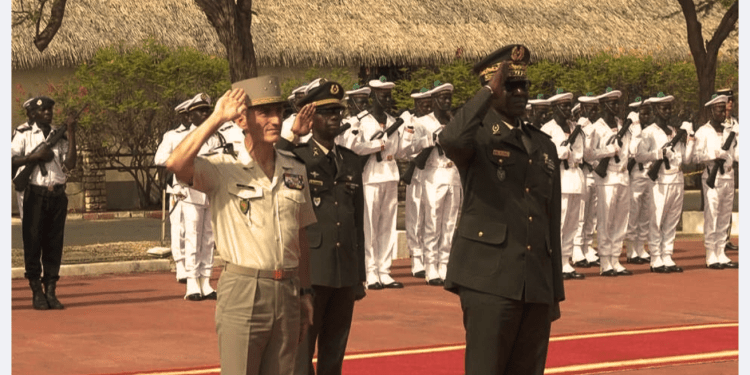France’s Historic Military Withdrawal from Senegal: End of Colonial Legacy or New Geopolitical Game?
Introduction
The West African country Senegal experienced a historic moment when France withdrew its permanent military presence on July 17, 2025 thus ending more than 100 years of foreign military oversight. The current move has triggered political discussions among analysts who doubt it marks the actual conclusion of France’s colonial presence in Africa while speculating about emerging geopolitical interests in the continent.
This paper explores the historical French military engagement in Senegal through a discussion of withdrawal events and Senegalese and international responses as well as implications for Africa and global power relations.
The Long Shadow of Colonialism
France’s Historic Military Withdrawal from Senegal
The French established their first African settlement at Saint-Louis during the mid-17th century. French control of Senegal persisted through three centuries after the country gained independence in 1960.
The post-independence defense cooperation between Senegal and France maintained operational military bases in the country with Camp Geille in Dakar functioning as the principal strategic facility. These bases maintained their status as French neo-colonial outposts and faced persistent criticism from Senegalese nationalists as well as pan-African groups.
The Road to Withdrawal
The process toward French military withdrawal took several years to achieve. The perception of political manipulation and economic dependence and military intrusions throughout West Africa caused rising opposition against France since the 2010s.
In 2023 France started reducing its military operations in Mali and Burkina Faso after the countries experienced political coups alongside massive demonstrations against French involvement. The political instability led Niger to request the removal of French troops in 2024.
France maintained Senegal as its main regional ally despite the country being its most reliable partner. French government negotiations for complete withdrawal resulted from increasing protests in Dakar as well as political changes that promoted full Senegalese sovereignty.
On July 17, 2025, Senegal took full control of Camp Geille from French forces marking a significant change in relations between France and Senegal.
Why This Move Matters
The removal of French military forces signifies a transformative event that transforms Africa’s international dynamics.
The complete French military departure from Senegal enables the country to exercise complete territorial governance.
The move of Senegal has motivated Chad and Ivory Coast and Gabon to establish new military alliances that challenge their traditional alliances.
Senegal will likely build stronger alliances with non-Western powers such as China, Turkey and Russia as these nations expand their presence in Africa.
Security Challenges: The withdrawal raises concerns about regional security, especially as jihadist threats persist in neighboring Mali and Burkina Faso.
Economic Realignment: Senegal will need to find alternative economic partners and increase its domestic military capabilities because foreign military assistance decreases.
The Bigger Picture: France’s Waning Power in Africa
France’s departure from Senegal represents a larger Western military decline across the African continent. In recent years:
- The countries of Mali, Burkina Faso and Niger established a Sahel military alliance that excluded France from membership.
Read more about the incredible Arctic rowing achievement:
Jimmy Graham’s 584-Mile Arctic Rowing World Record - The military presence of Russia’s Wagner Group and Turkey continues to grow in the Sahel region.
- China has increased its investments in African infrastructure by half.
Africa may experience a transition towards balanced diplomacy with multiple global powers following France’s departure from Senegal because countries want to avoid dependence on one Western nation.
Local and International Reactions
The Senegalese population has received the withdrawal positively because it represents a triumph for national independence and national identity. The hashtag #SenegalIndependence trended on Twitter while people in Dakar celebrated the occasion through various activities on social media platforms.
The decision received a reframed explanation from French officials who described it as a “repositioning” policy instead of withdrawal yet maintained their commitment to training and intelligence cooperation as well as joint counterterrorism efforts.
The African Union (AU) expressed approval of Senegal’s peaceful decision to claim full national sovereignty but other observers raised concerns about security consequences in the area.
What Happens Next for Senegal?
- The Senegalese military should expect modernization and expansion to compensate for the absence of French troops.
- Senegal will strengthen its relationships with China and Turkey as well as other rising international powers through diplomatic means.
- The Senegalese economy faces economic pressure due to the loss of French military contracts but new international partnerships along with local industrial growth could reduce these negative effects.
- The move will create increased national pride which should lead to higher political engagement and national unity among Senegalese citizens.
Conclusion
The withdrawal of French military forces from Senegal marks the conclusion of an historic era while it could signal the beginning of a new African geopolitical era. Different observers welcome the move as a path toward full independence yet others worry that it could result in increased foreign interference from non-Western nations and unstable regional dynamics.
Senegal faces an important period ahead which will decide its path toward becoming an independent force within African and global political frameworks.
Key Takeaways
- The French government has formally closed down its military operations in Senegal following hundreds of years of dominance.
- The nation secured a triumph in sovereignty together with national pride.
- The shift in power dynamics reshapes regional partnerships which sparks questions about Africa’s evolving international relationships.
- The move brings both fresh prospects and possible security threats into play.




